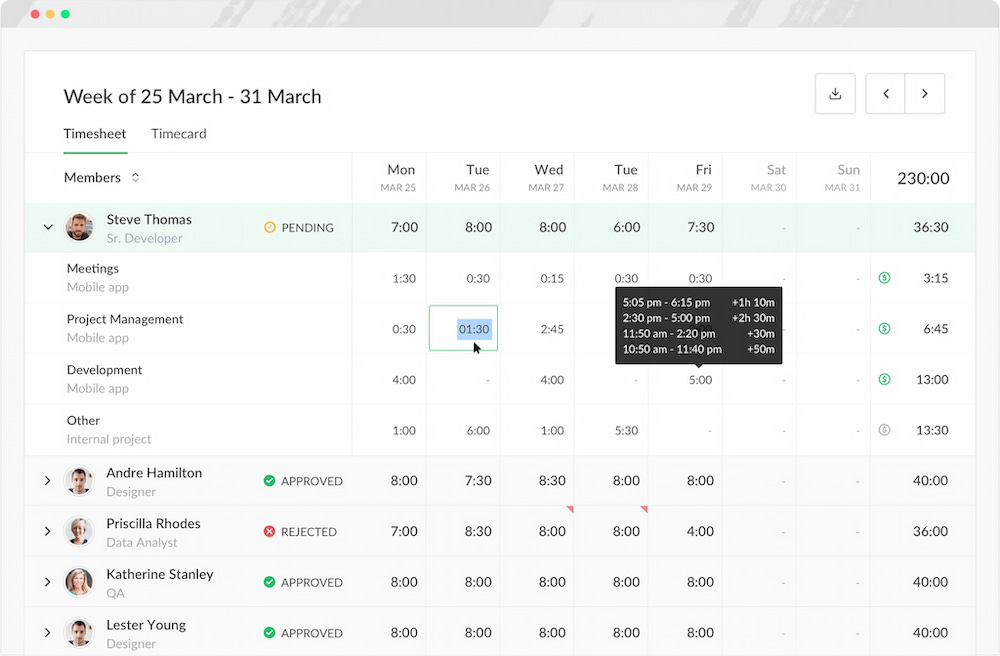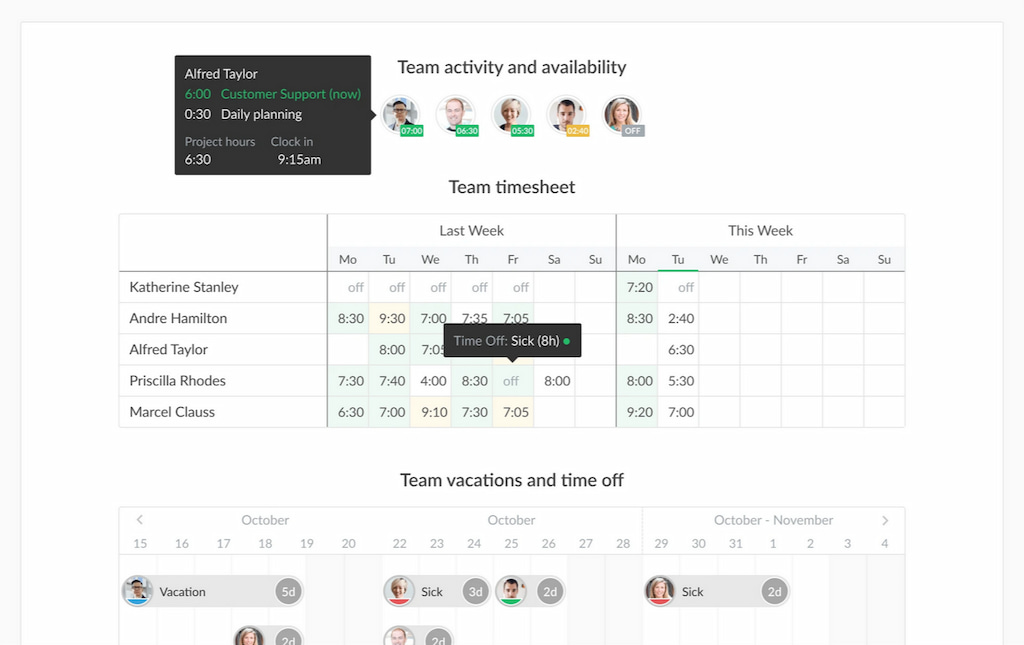Time tracking vs objectives is a growing debate, especially as more teams go remote and shift focus to outcomes. Do you need to log hours, or is hitting goals enough? Some see time tracking as outdated. Others feel goal-only approaches lack structure. But the smartest teams combine both: time tracking shows where effort goes, and objectives show what that effort achieves. In this article, we explore the pros and cons of each, share examples and research, and show how a time tracker like Everhour helps you align both without extra admin.
📏 What Is Time Tracking?
The best productivity time tracking software records how long team members spend on tasks, projects, and clients. It’s useful for:
- 📊 Budget planning
- 💸 Billing clients
- 🧾 Payroll processing
- 👥 Assigning resources
- 📈 Understanding productivity
Modern tools like Everhour go beyond basic timers. They let you:
- ✅ Track time by project or task
- 🔗 Sync with tools like Asana, Trello, Notion, ClickUp
- ⏱️ Compare actual time to estimated time
- 📊 Use dashboards to manage workloads
- 🧭 Build transparency without micromanagement

💡 This builds time awareness, helping team members estimate better and stay on top of their workload. Everhour makes the data useful, not stressful — so teams feel supported, not watched.
🎯 What Is the Objectives-Based Approach?
This strategy focuses on outputs instead of hours:
- ✅ Are goals being met?
- 📌 Are OKRs (objectives and key results) on track?
- 📈 Do team efforts drive real business impact?
It’s popular in creative, strategic, and startup environments where autonomy is key.
But it can fall short if:
- ❓ You can’t track why goals aren’t met
- ⏳ You don’t know how much effort went into something
- ⚖️ Workloads get out of balance
🧠 Objectives show what needs to be done — but not always how or how much effort it takes.
💥 Pros and Cons: Side-by-Side
| 📊 Metric | ⏱️ Time Tracking | 🎯 Objectives-Based |
|---|---|---|
| Focus | Effort (inputs) | Results (outputs) |
| Great for | Billing, planning, team health | Strategy, creativity, innovation |
| Pros | Visibility, clarity, payroll help | Autonomy, motivation, goal focus |
| Cons | Can feel rigid | Can miss context or invisible effort |
Using both helps balance structure with flexibility.
💬 What Leaders Say on Reddit
“You can’t manage what you don’t measure. We track time to spot scope creep—not punish people.” — r/ceo
“OKRs sound great, but when goals are missed, time logs tell us why.” — r/startups
“Our dev team uses both. Objectives guide strategy; time tracking supports billing and balance.” — r/TimeTrackingSoftware
Teams are realizing that goals and time data work better together.
🔍 What Research Shows
Studies back up the time tracking vs objectives hybrid model:
- Harvard Business Review: Time + objectives = better forecasting and happier teams
- Gallup: Time tracking improves performance by 21% when used for insight, not control
- Buffer: Autonomy boosts trust, but leaders still want data
- McKinsey: Merging OKRs with time tracking cut overspending by 17%
- Asana Work Index: Teams using both hit 31% more quarterly goals
The key is using time data as support, not surveillance.
🧠 When Time Tracking Fails (and How to Fix It)
Time tracking fails when:
- 🚫 It’s used to control, not support
- ❌ Goals aren’t clear
- 🤷 Employees don’t understand the benefits
- 🔄 It’s not built into the daily workflow
Everhour helps by:
- 🔍 Giving access to data for both managers and teams
- 🔒 Offering privacy controls
- 🔗 Syncing with your favorite project tools
- 🎯 Connecting time entries to business goals
- 📊 Creating simple, smart reports
🤝 This makes time tracking use cases important and it becomes a shared tool, not a top-down rule.
🚀 When to Use Time, Objectives, or Both
| Scenario | Time tracking | Objectives | Both |
|---|---|---|---|
| Client invoicing | ✅ | ❌ | ✅ |
| Goal planning | ❌ | ✅ | ✅ |
| Remote team check-ins | ✅ | ✅ | ✅ |
| Payroll | ✅ | ❌ | ✅ |
| Creative work | ❌ | ✅ | ✅ |
| Project planning | ✅ | ✅ | ✅ |
| New hire onboarding | ✅ | ✅ | ✅ |
| Performance reviews | ✅ | ✅ | ✅ |
🧰 Why Everhour Supports Both Approaches
Everhour isn’t just a timer—it’s a time intelligence platform. It helps teams:
- Track real effort on real work
- Connect time to OKRs and budgets
- See what’s working (and what’s not)
- Give leaders data without micromanaging

Example: A marketing team aims to grow leads by 20%. Everhour shows they’re spending 60% of their time on low-performing channels. Adjusting effort helps hit the target.
With Everhour, you match your time with your strategy.
📈 Business Wins When You Combine Time + Goals
- Higher profits: See true time costs per project
- Better utilization: Know what’s billable vs admin
- Prevent burnout: Spot early signs of overwork
- Smarter planning: Match time to outcomes
- Hiring clarity: Know when to scale your team
- Happier clients: Deliver more on budget
- Higher revenue per employee: Focus effort where it matters most
🗣 Real Testimonials From Teams Using Everhour
“Everhour is a well-designed, easy to use, powerful time-tracking tool that has one of the most unique integrations with a number of key Saas productivity tools. It seamlessly flows into the UI of apps like Asana and Notion in ways that enhance the experience for both apps. I don’t see any other apps in the market doing this as well as Everhour does.” [DJ C., founder, G2]
“We use Everhour along linear.app for tracking not only the hours but also our project budgets as an IT consultancy. The various tables, charts and other analytical visuals are making it really easy to track who is working on what.” [Florian, CTO, G2]
“I’ve been using Everhour for over a year and things have been great. I’ve used the major alternatives and Everhour is the most seamless to use with the most features. Its seamless integration with Asana. The ability to capture data directly from Asana and track time without having to define a project every time you need to do so is a huge time saver. The ability to also track budget based on whatever ways work best for your business model is fantastic as well (e.g. by cost, hours, billing, etc.).” [Skyler R., CEO, Capterra]
🎯 Bottom Line: Use Time Tracking vs Objectives Together
It’s not either/or. Today’s teams need visibility and autonomy. Goals give direction. Time shows effort. Together, they bring clarity and momentum.
Everhour supports both sides, with tools that help your team do better work without stress.
📌 Tip: Getting Buy-In for Time Tracking or OKRs
✨ New systems affect culture. To get team support, keep it simple and human:
- 👥 Test with a small group first — let champions lead the way
- 🗣️ Explain the reason — be transparent and open
- 🎯 Focus on team benefits — less stress, more clarity
- 📈 Show early wins — smoother planning, fewer surprises, less burnout
🤝 People support what they help build. Start small. Let trust grow.
Explore more:
- How to introduce time tracking without scaring your team
- Discover the best software for tracking employee productivity
- The true cost of untracked time in project-based businesses
- How to align payroll, budgets, and client billing without spreadsheets
- How do high-performing agencies track time without killing culture
👉 Discover how to implement time tracking without the revolt—boost transparency, protect team trust, and get better results without the pushback.
Wondering if time tracking is micromanagement? Learn how it can build trust—not control—when done right.
![time tracking vs objectives: productivity metrics that actually work [2025]](https://blog-cdn.everhour.com/blog/wp-content/uploads/2025/07/khanh-nguyen-gDLy_16VgZk-unsplash.jpg)
